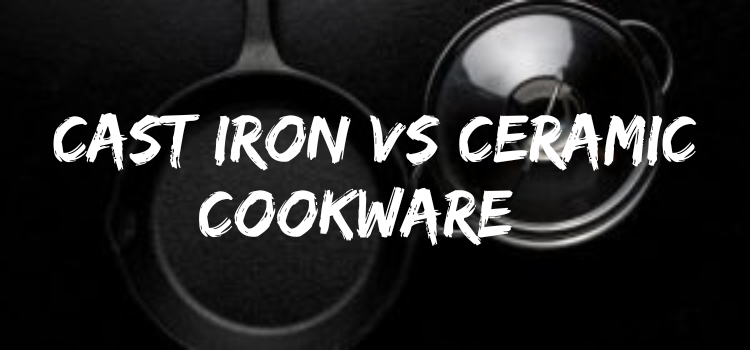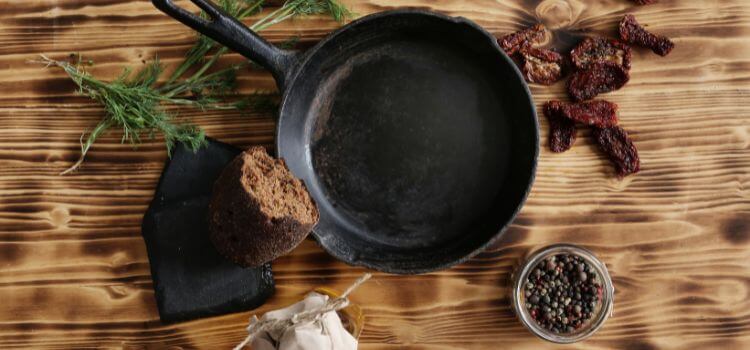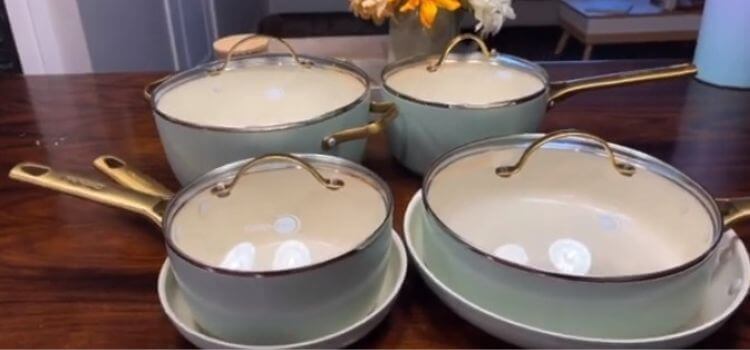As an Amazon Associate, I earn from qualifying purchases.
As an Amazon Associate, I earn from qualifying purchases
The selection of cookware is an essential part of having a well-equipped kitchen because it determines the results of your culinary experiments.
Ceramic cookware and cast iron cookware are two of the many alternatives available. You may adjust the pros and cons of these two materials to fit your needs and preferences in the kitchen. What follows is an examination of the similarities and differences between
Compare and contrast cast iron and ceramic cookware, comparing and contrasting their distinct features, advantages, and disadvantages so that you can make a well-informed choice for your cooking needs.
So that you can make an informed decision, let’s look at the differences and similarities between ceramic and cast-iron cookware.

Comparison between cast iron and ceramic cookware:
1. Details of Cast Iron Cookware:
Advantages of Cast Iron Cookware:
- Durability: Cast iron cookware has a stellar reputation for long-lasting. It might be a good investment because, with proper care, it could live for millennia.
- Excellent Heat Retention: Cast iron’s heat retention capabilities are second to none, allowing even heating throughout the cooking surface. Because of this quality, it is ideal for slow cooking, which results in a gorgeously browned crust on food.
- Versatility: Cast iron’s remarkable adaptability is demonstrated by the fact that it may be used on various cooking surfaces, including stovetops, ovens, grills, and even open flames.
- Natural Non-Stick Properties: Cast iron can acquire natural non-stick characteristics through seasoning, which entails adding layers of baked-on oil to the surface. This makes it easier to clean and reduces the need for excessive oil.
- Affordability: Compared to other high-end options, cast-iron cookware is typically more affordable, giving you more bang for your buck.
Pros :
- Consistent Cooking and Browning: Cast iron’s capacity to disperse heat evenly guarantees consistent cooking and browning.
- Versatile Cooking Methods: Use It for Everything From Frying and Searing to Baking and Roasting; It’s Versatile in the Kitchen.
- Resilience and longevity: Cast iron cookware, if cared for correctly, may endure for decades, making it a cost-effective option over time.
- Superior Non-Stick Surface: With proper seasoning, cast iron pans can hold their own against non-stick alternatives without worrying about hazardous coatings.
- Cost-Effective: Cast iron is an economical material that provides long-lasting performance and a good value for the money.

Cons :
- Weight: Cast iron cookware is notably heavy, which can be cumbersome to handle and clean, especially for some users.
- Seasoning Maintenance: Maintaining the seasoning layer is crucial for its non-stick properties and may require periodic re-seasoning.
- Slow Heating: Cast iron takes a bit longer to heat up than other materials, demanding patience when cooking.
- Rust Susceptibility: Cast iron can rust if not dried and seasoned correctly.
2. Details of Ceramic Cookware:
Advantages of Ceramic Cookware:
- Non-Stick Surface: Ceramic cookware typically comes with a surface that does not stick, making it simple to cook with a small amount of oil and allowing food to release without difficulty.
- Lightweight: Ceramic cookware is often lighter than cast iron cookware, which makes casting iron cookware more difficult to handle in the kitchen.
- Simple Cleaning Procedures: The non-stick qualities of ceramic make it easy to clean, typically requiring only a fast wipe to remove any deposits that may have accumulated.
Pros :
- Cooking without a stick: Ceramic cookware offers excellent non-stick capabilities, reducing the need for excessive fats and oils.
- Not heavy: Its lighter weight makes it more accessible for those who struggle with heavy cookware.
- Not Difficult to Clean: Cleaning ceramic cookware is typically straightforward, as food tends to slide off the smooth surface.

Cons :
- Durability: Ceramic coatings can be prone to chipping or wearing off over time, potentially reducing the lifespan of the cookware.
- Temperature Sensitivity: Ceramic cookware may not handle high temperatures as well as cast iron, limiting its versatility for certain cooking methods.
- Limited Versatility: Ceramic cookware is often not suitable for use with metal utensils, and it may not be as versatile across different cooking surfaces.
FAQs: cast iron vs. ceramic cookware:
Cast iron cookware’s primary advantage is its exceptional heat retention and even heat distribution, which makes it ideal for various cooking techniques and achieving a beautifully seared finish on dishes.
Is ceramic cookware truly non-stick, and how does it compare to cast iron in this regard?
Yes, ceramic cookware often features a non-stick surface that allows for cooking with minimal oil and easy food release. It competes with cast iron in terms of non-stick capabilities, but without the need for seasoning.
Ceramic cookware is generally lighter than cast iron, making it a better choice for individuals who prefer more manageable and lightweight kitchen equipment.
Cast iron cookware exhibits exceptional versatility since it may be employed across a range of cooking surfaces, including stovetops, ovens, grills, and open fires. Ceramic cookware may have limitations and may not be suitable for all cooking surfaces.
For cast iron, maintaining the seasoning layer is essential for non-stick properties and rust prevention. Ceramic cookware should be handled with care to avoid chipping the ceramic coating.
These FAQs aim to provide concise answers to common questions that may arise when deciding between cast iron and ceramic cookware.
Conclusion:
In conclusion, choosing cast iron and ceramic cookware ultimately hinges on your cooking preferences, needs, and priorities. Both materials present unique advantages and disadvantages, and comprehending these distinctions will facilitate an informed decision-making process for your kitchen.
That’s it for now. You can also review our other topics titanium vs aluminum cookware and ceramic vs titanium cookware .
Enjoy your cooking.
Amazon and the Amazon logo are trademarks of Amazon.com, Inc. or its affiliates.
Leave a Reply